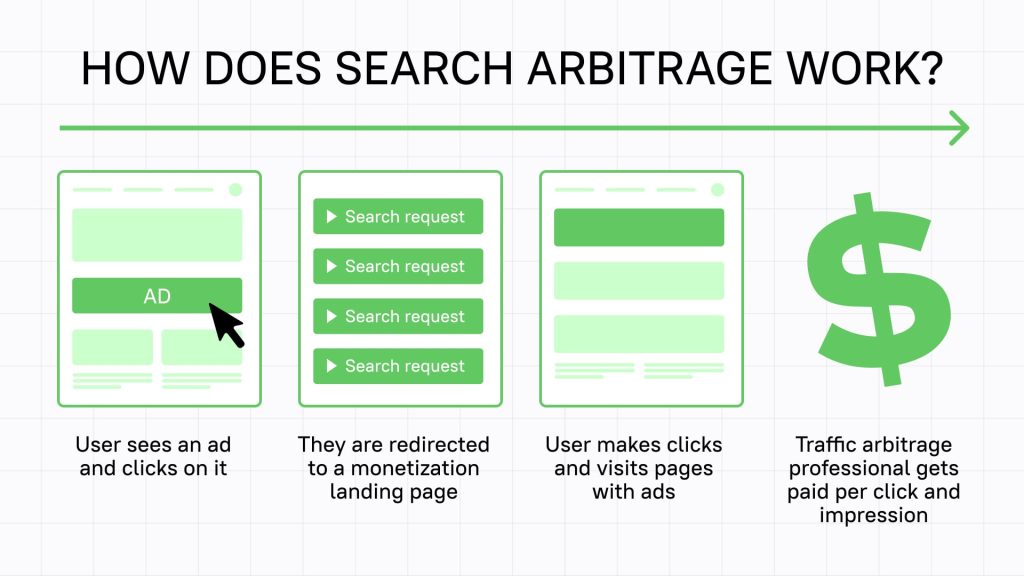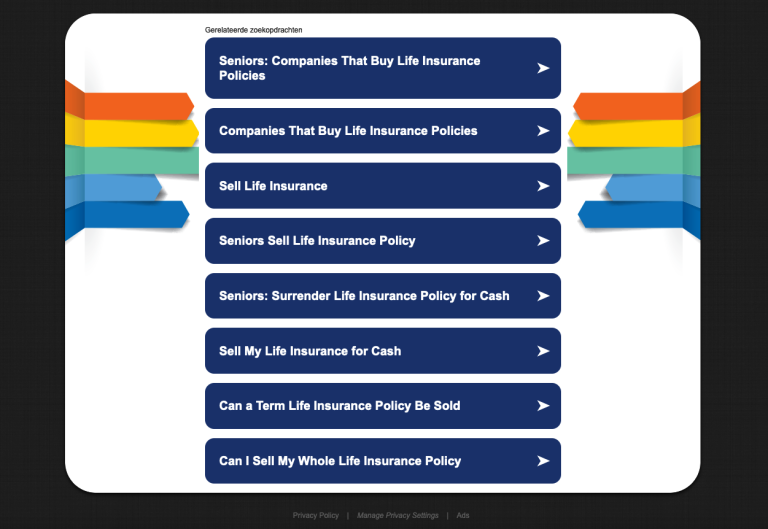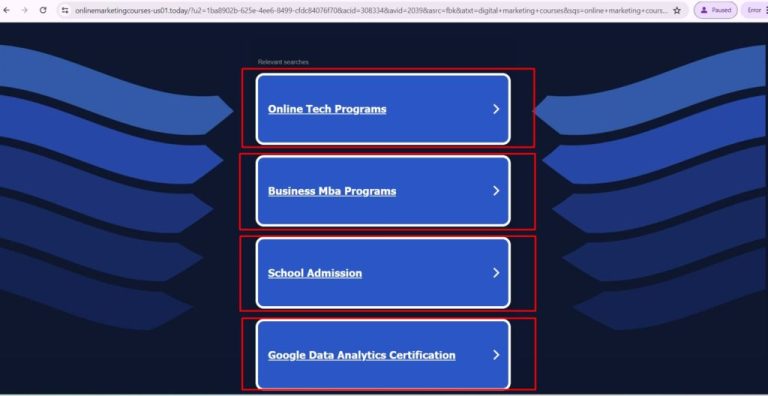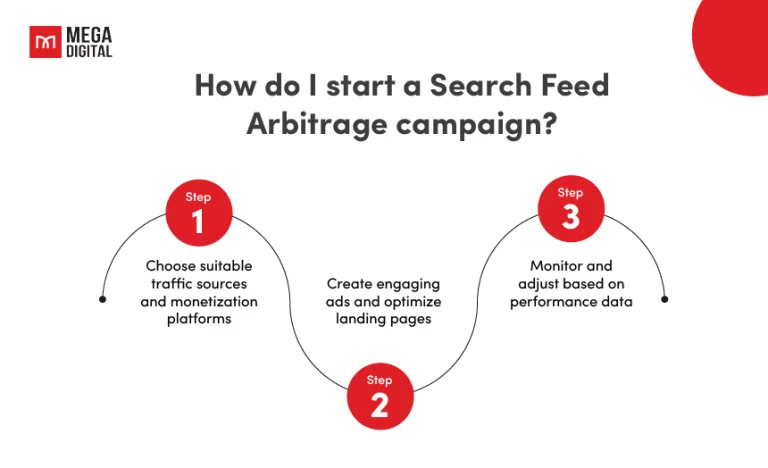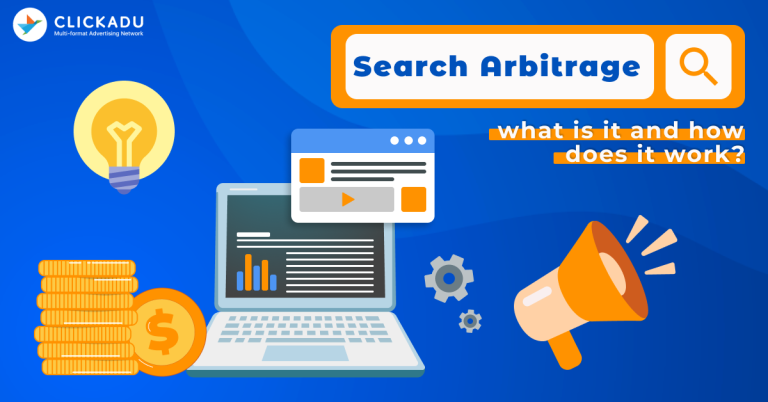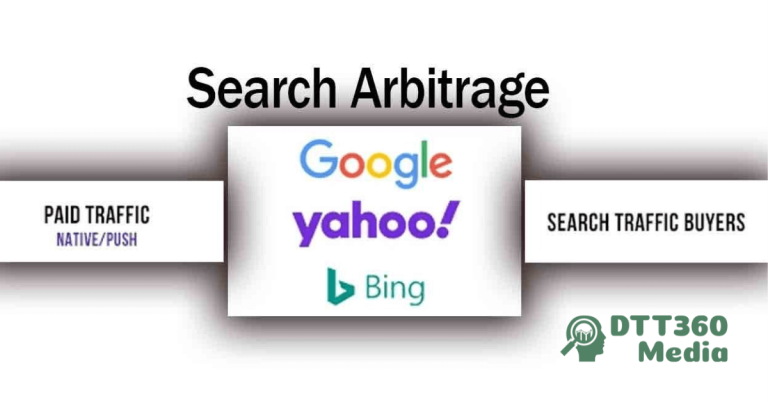How to Start Search Arbitrage: Maximize Profits in 5 Steps
Want to make money online? Search arbitrage might be the answer. This strategy involves buying traffic from one platform and selling it for a higher price elsewhere. Search arbitrage can seem complicated at first. But with the right steps, it becomes manageable. This method leverages paid search ads to generate profits.
By understanding the basics and honing your skills, you can tap into a lucrative opportunity. In this blog post, we will break down the process of starting search arbitrage. From selecting the right platforms to optimizing your campaigns, we’ll cover everything you need to know. Get ready to explore a new avenue for online income. Let’s dive into the world of search arbitrage together!
Introduction To Search Arbitrage
Starting search arbitrage can be a profitable venture in the world of digital marketing. This technique involves leveraging differences in traffic costs and ad revenue to generate profits. For beginners, understanding the basics is crucial. In this section, we will introduce search arbitrage and its benefits.
What Is Search Arbitrage?
Search arbitrage is a strategy where marketers buy traffic at a low cost and sell it at a higher rate. This involves placing ads on search engines and other platforms to attract visitors to a site where higher-paying ads are displayed. The difference between the cost of traffic and the ad revenue is the profit.
This method leverages Online Advertising Strategies and Ad Placement Optimization to maximize returns. Here are the key components of search arbitrage:
- Keyword Research: Identifying low-cost, high-traffic keywords.
- PPC Advertising: Using platforms like Google Ads to buy traffic.
- Ad Placement Optimization: Placing ads strategically to attract clicks.
- Affiliate Marketing: Promoting products or services for a commission.
The process involves careful Search Engine Marketing to ensure the traffic generated converts into revenue. By focusing on Cost-Per-Click (CPC) and optimizing ads, marketers can achieve a high Return On Investment (ROI).
Benefits Of Search Arbitrage
Search arbitrage offers several benefits that make it an attractive strategy for digital marketers. Some key advantages include:
- High ROI: By optimizing ad placements and targeting the right audience, marketers can achieve significant returns on their investment.
- Scalability: This method can be scaled up easily by increasing the budget for PPC campaigns and expanding the number of keywords targeted.
- Low Entry Barrier: Beginners can start with a small budget and gradually increase their investment as they learn and refine their strategies.
Here’s a table summarizing the key benefits:
| Benefit | Description |
|---|---|
| High ROI | Optimized ad placements lead to better returns. |
| Scalability | Easy to scale up with increased budget and keywords. |
| Low Entry Barrier | Start with a small budget and grow over time. |
Another advantage is the ability to leverage various Traffic Generation methods. By using different Digital Marketing techniques, marketers can diversify their traffic sources and reduce dependency on a single platform.
Overall, search arbitrage is a powerful strategy that combines various elements of online marketing to generate profits. With careful planning and execution, it can be a lucrative venture.

Credit: www.linkedin.com
Market Research
Search arbitrage can be a profitable online business if done correctly. One of the most critical steps to success in search arbitrage is market research. Understanding the market helps you make informed decisions, identify profitable niches, and analyze competitors. It ensures that you invest your time and resources in the right areas.
Identifying Profitable Niches
Finding the right niche is the first step in search arbitrage. A niche is a specific segment of the market that you target. Here are some tips to identify profitable niches:
- Keyword Research: Use tools like Google Keyword Planner to find keywords with high search volume and low competition. Look for keywords that relate to specific interests or needs.
- Trend Analysis: Use platforms like Google Trends to identify what people are currently interested in. This can help you find trending topics that can drive Traffic Generation.
- Market Demand: Check forums, social media, and online communities to see what people are discussing. This can give you ideas about what products or services are in demand.
Consider using a table to compare different niches:
| Niche | Search Volume | Competition | Potential ROI |
|---|---|---|---|
| Health and Wellness | High | Medium | High |
| Technology Gadgets | Medium | High | Medium |
| DIY Home Projects | Low | Low | Medium |
Always choose a niche that aligns with your interests and expertise. This makes it easier to create content and engage with your audience. Remember, the goal is to find a balance between search volume and competition to maximize your ROI.
Analyzing Competitors
Understanding your competitors is essential in search arbitrage. Analyzing competitors helps you learn from their successes and avoid their mistakes. Here are some steps to analyze competitors:
- Identify Competitors: Use search engines to find websites that rank for your target keywords. List the top 10 competitors in your niche.
- Analyze Traffic Sources: Use tools like SimilarWeb to see where your competitors get their traffic. Check if they rely on PPC Advertising, organic search, or social media.
- Evaluate Content: Look at the type of content your competitors create. Are they focusing on blogs, videos, or infographics? Note the quality and frequency of their content.
- Check Ad Networks: See which Ad Networks your competitors use. This can give you insights into effective platforms for your ads.
Consider creating a table to track competitor data:
| Competitor | Traffic Source | Content Type | Ad Networks |
|---|---|---|---|
| Competitor A | Organic Search | Blogs | Google Ads |
| Competitor B | Social Media | Videos | Facebook Ads |
| Competitor C | PPC Advertising | Infographics | Bing Ads |
Understanding competitors’ strategies helps you optimize your own. Focus on Conversion Optimization to improve your campaigns. Analyze their PPC Advertising techniques to see what works. This can help you enhance your own Digital Marketing Strategies.
Setting Up Campaigns
Setting up campaigns is a crucial step in starting search arbitrage. This involves choosing the right platforms, creating effective ads, and optimizing your landing pages. By carefully planning and executing these steps, you can drive more traffic and increase conversions.
Choosing Platforms
Choosing the right platforms is essential for successful search arbitrage. Different platforms offer various benefits and have unique audiences. Here are some key points to consider:
- Google Ads: The most popular platform for PPC advertising. It offers a wide reach and detailed targeting options.
- Bing Ads: Often overlooked, Bing Ads can be a cost-effective alternative with lower cost-per-click rates.
- Facebook Ads: Great for targeting specific demographics and interests. Useful for affiliate marketing campaigns.
- Ad Networks: Networks like Taboola and Outbrain can help you reach a broader audience through native ads.
Each platform has its strengths and weaknesses. Consider your goals and budget when selecting platforms. For instance, Google Ads might have a higher cost-per-click, but it often provides better traffic quality.
Here’s a simple comparison table:
| Platform | Reach | Cost-Per-Click | Best For |
|---|---|---|---|
| Google Ads | High | High | General Traffic |
| Bing Ads | Medium | Low | Cost-Efficiency |
| Facebook Ads | High | Variable | Demographic Targeting |
| Ad Networks | Variable | Medium | Broad Reach |
Choosing the right platform is the first step in successful search arbitrage strategies. Always test multiple platforms to find the best fit for your needs.
Creating Effective Ads
Creating effective ads is vital for driving traffic and conversions. Your ads must stand out and attract clicks. Here are some tips:
- Keyword Research: Use tools like Google Keyword Planner to find relevant keywords. Focus on high-traffic, low-competition keywords.
- Ad Copy: Write clear and compelling ad copy. Highlight unique selling points and include a strong call-to-action.
- Bidding Strategies: Choose the right bidding strategy for your goals. Manual bidding gives more control, while automated bidding saves time.
- Landing Page Optimization: Ensure your landing page is relevant to the ad. It should load quickly and have a clear call-to-action.
Using these tips, your ads will be more likely to attract clicks and conversions. For example, an ad for a weight loss product might include:
- Headline: “Lose Weight Fast with Our Natural Supplement!”
- Description: “Try our new formula. 30-day money-back guarantee. Click to learn more!”
- Call-to-Action: “Order Now and Save 20%!”
By focusing on keyword research, bidding strategies, and landing page optimization, you can create ads that perform well in PPC advertising campaigns. Effective ads are key to successful search arbitrage strategies.

Credit: www.youtube.com
Traffic Sources
Search arbitrage is an effective strategy to generate profit by buying low-cost traffic and selling it at a higher price. Understanding traffic sources is crucial to succeed in search arbitrage. Two major traffic sources are organic and paid traffic. Each has its benefits and challenges. Let’s explore how to use these sources effectively.
Organic Vs Paid Traffic
Organic traffic comes from search engines like Google, Bing, and Yahoo. It is free and driven by SEO techniques such as keyword research and content creation. Organic traffic is sustainable and can provide long-term benefits. Here are some advantages of organic traffic:
- Cost-effective
- Builds trust and credibility
- Long-lasting results
Despite these benefits, organic traffic requires time and effort. Consistent optimization and content updates are necessary to maintain and improve search rankings.
Paid traffic involves PPC advertising where you pay for each click on your ads. Google Ads and Bing Ads are popular platforms for paid traffic. Paid traffic offers quick results and precise targeting. Here are some benefits of paid traffic:
- Immediate results
- Scalable
- Targeted audience
While paid traffic can drive quick traffic generation, it requires a budget and continuous monitoring. Effective bidding strategies and conversion optimization are essential to maximize ROI.
Below is a comparison table of organic and paid traffic:
| Aspect | Organic Traffic | Paid Traffic |
|---|---|---|
| Cost | Free | Paid |
| Time to Results | Slow | Fast |
| Longevity | Long-term | Short-term |
Leveraging Social Media
Social media platforms are excellent for traffic generation. They provide opportunities for both organic and paid traffic. Platforms like Facebook, Instagram, Twitter, and LinkedIn can drive significant traffic to your site.
Here are some tips to leverage social media:
- Create engaging content
- Use relevant hashtags
- Engage with your audience
- Run targeted ads
- Collaborate with influencers
Paid social media ads can be highly effective. They allow precise targeting based on demographics, interests, and behavior. This ensures your ads reach the right audience. Implementing effective search arbitrage strategies on social media involves:
- Setting clear goals
- Allocating a budget
- Creating compelling ad copies
- Monitoring and adjusting campaigns
Social media also aids in online marketing and affiliate marketing. Share valuable content to attract organic followers. Promote affiliate products to earn commissions. Combining social media efforts with SEO techniques enhances traffic and conversions.
Leveraging social media effectively can boost your search arbitrage success. Use both organic and paid strategies to maximize results. Focus on creating high-quality content and engaging with your audience to build a loyal following.
Cost Management
Starting with search arbitrage requires a solid understanding of cost management. Effective cost management ensures you make the most out of your advertising budget and maximize your returns. This involves planning your ad spend carefully and optimizing your strategies to get the best results. Let’s explore how to manage your costs efficiently.
Budgeting For Ads
Ad Budget Management is crucial in search arbitrage. You need to allocate your funds wisely to maximize your returns. Start by setting a clear budget for your Pay-Per-Click Advertising campaigns. This involves deciding how much you are willing to spend daily, weekly, or monthly.
Here are some key steps:
- Determine Your Total Budget: Decide on the total amount you can afford to spend on ads.
- Allocate Funds: Split your budget across different campaigns and platforms.
- Set Bid Limits: Define the maximum amount you are willing to pay per click or impression.
Consider using a table to track your ad spend:
| Campaign | Daily Budget | Bid Limit | Platform |
|---|---|---|---|
| Campaign A | $50 | $1.50 | Google Ads |
| Campaign B | $30 | $1.00 | Bing Ads |
Tracking your spending helps you stay on budget. Adjust your strategy based on performance. Use Digital Advertising Techniques to refine your approach and get better results.
Maximizing Roi
Maximizing ROI is about getting the most value from your ad spend. Focus on Conversion Optimization to improve the effectiveness of your ads. Start with Keyword Research to find the best keywords for your campaigns. High-quality keywords lead to higher conversion rates.
Here are some tips:
- Optimize Ad Copy: Write compelling ads that encourage clicks and conversions.
- Use Landing Pages: Direct traffic to relevant pages that match the ad’s message.
- Analyze Performance: Conduct ROI Analysis regularly to see which ads perform best.
- Adjust Bids: Increase bids on high-performing keywords and reduce bids on low-performing ones.
Consider the following table to track ROI:
| Campaign | Spend | Conversions | Revenue | ROI |
|---|---|---|---|---|
| Campaign A | $500 | 50 | $1500 | 200% |
| Campaign B | $300 | 30 | $900 | 200% |
Tracking these metrics helps you understand what works best. Use this information to refine your Search Arbitrage Strategy. The goal is to increase profit margins by spending less and earning more. Effective Traffic Acquisition is key to driving high-quality visitors who are more likely to convert.
Tracking Performance
To succeed in search arbitrage, tracking performance is crucial. Understanding how your campaigns are performing helps you make informed decisions. You can optimize your strategies and maximize your return on investment (ROI). This section will guide you on what metrics to monitor and the tools you can use for analytics.
Key Metrics To Monitor
Monitoring key metrics is essential for effective search arbitrage strategies. These metrics provide insights into the performance of your PPC campaigns and help you adjust bidding strategies accordingly.
Here are some important metrics to keep an eye on:
- Cost-Per-Click (CPC): This metric shows the average amount you pay for each click on your ad. Lowering CPC without sacrificing ad quality can improve your ROI.
- Click-Through Rate (CTR): CTR measures the number of clicks your ad receives divided by the number of impressions. A higher CTR indicates that your ad is relevant and engaging.
- Conversion Rate: This is the percentage of visitors who take the desired action on your site, such as making a purchase or signing up for a newsletter. Monitoring conversion rates helps you understand the effectiveness of your ad placement and landing pages.
- Return on Investment (ROI): This metric calculates the profitability of your online advertising campaigns. It’s crucial to ensure that the revenue generated from your campaigns exceeds the costs.
- Traffic Sources: Knowing where your traffic is coming from helps you identify which sources are most effective. This information can guide your keyword research and ad placements.
Here’s a table summarizing these key metrics:
| Metric | Description | Importance |
|---|---|---|
| Cost-Per-Click (CPC) | Average cost paid for each click on your ad | Helps manage ad spend |
| Click-Through Rate (CTR) | Ratio of clicks to impressions | Indicates ad relevance |
| Conversion Rate | Percentage of visitors converting | Measures campaign effectiveness |
| Return on Investment (ROI) | Profitability of campaigns | Ensures financial viability |
| Traffic Sources | Origins of site traffic | Guides keyword and ad strategies |
Tools For Analytics
To track these metrics, you need reliable analytics tools. These tools provide comprehensive insights and help you refine your search arbitrage strategies.
Here are some popular tools to consider:
- Google Analytics: This tool offers detailed reports on traffic sources, user behavior, and conversion tracking. It’s essential for understanding how visitors interact with your site.
- Google Ads: Google Ads provides insights on CPC, CTR, and ROI. It also helps you manage your bidding strategies and optimize ad placements.
- SEMrush: SEMrush is a powerful tool for keyword research and competitor analysis. It helps you identify profitable keywords and monitor your competitors’ strategies.
- Ahrefs: Ahrefs is another great tool for keyword research and backlink analysis. It provides valuable data to improve your search arbitrage strategies.
- Hotjar: Hotjar offers heatmaps and session recordings. This helps you understand user interactions and improve your landing pages for better conversion rates.
Using these tools, you can gather essential data and optimize your PPC campaigns. Here’s a quick comparison of these tools:
| Tool | Key Features | Best For |
|---|---|---|
| Google Analytics | Traffic analysis, conversion tracking | Understanding user behavior |
| Google Ads | PPC metrics, bidding strategies | Managing ad campaigns |
| SEMrush | Keyword research, competitor analysis | Identifying profitable keywords |
| Ahrefs | Backlink analysis, keyword research | Improving search strategies |
| Hotjar | Heatmaps, session recordings | Enhancing user experience |
These tools are invaluable for tracking the performance of your search arbitrage efforts. They help you make data-driven decisions and continuously improve your online advertising campaigns.
Scaling Operations
Starting search arbitrage can be a lucrative venture, but to make the most out of it, scaling operations is crucial. Scaling means expanding your reach, automating processes, and optimizing your campaigns. It helps you handle larger volumes of traffic and conversions without increasing your workload proportionally. Let’s dive into how you can effectively scale your search arbitrage operations.
Expanding Campaigns
To expand your campaigns, consider focusing on these key areas:
- Keyword Research: Identify new keywords that can drive more traffic. Use tools like Google Keyword Planner or SEMrush to find high-traffic keywords.
- Ad Bidding: Adjust your bids to ensure your ads appear in top positions. This can increase click-through rates and conversions.
- Digital Marketing Techniques: Integrate various digital marketing techniques like social media advertising, email marketing, and content marketing to reach a broader audience.
- Affiliate Marketing: Partner with affiliates to promote your products. This can help you reach new audiences without significant upfront costs.
Here’s a simple table to help you organize your campaign expansion:
| Action | Tool/Method | Expected Outcome |
|---|---|---|
| Keyword Research | Google Keyword Planner | Identify high-traffic keywords |
| Ad Bidding | Google Ads | Higher ad positions |
| Digital Marketing Techniques | Social Media, Email Marketing | Broader audience reach |
| Affiliate Marketing | Affiliate Networks | New audience acquisition |
Automating Processes
Automation is essential for scaling operations in search arbitrage. Here are some strategies to automate your processes:
- Ad Campaign Management: Use tools like Google Ads Editor or Bing Ads Editor to automate your ad campaigns. This saves time and ensures your ads run smoothly.
- Traffic Generation: Automate traffic generation using platforms like AdRoll or Taboola. These tools can help you manage multiple ad channels from a single dashboard.
- Conversion Optimization: Employ tools like Optimizely or VWO to automate A/B testing and conversion rate optimization. This helps you improve your campaigns without manual intervention.
- Cost-Per-Click (CPC) Management: Automate your CPC bidding using scripts or automation tools available in Google Ads. This ensures you get the best value for your ad spend.
Here’s a list of tools to help you automate different aspects of your search arbitrage operations:
- Google Ads Editor: For managing ad campaigns.
- AdRoll: For automating traffic generation.
- Optimizely: For conversion optimization.
- Google Ads Scripts: For automating CPC management.
By automating these processes, you can focus on strategic tasks rather than getting bogged down in daily operations. This not only increases efficiency but also helps in achieving better results from your search arbitrage strategies.
Credit: richads.com
Common Pitfalls
Starting in the world of search arbitrage can be exciting but challenging. Many new marketers fall into common pitfalls that hinder their progress. Understanding these pitfalls is crucial for success. This section will discuss how to avoid these mistakes and learn from failures in search arbitrage.
Avoiding Mistakes
When venturing into search arbitrage, it’s easy to make mistakes that can cost you time and money. Here are some common mistakes and how to avoid them:
- Ignoring Keyword Research: Proper keyword research is vital. Without it, you might target keywords with low traffic or high competition.
- Overlooking Conversion Rates: Focus on conversion rates, not just traffic. High traffic with low conversions is not profitable.
- Poor Budget Management: Set a clear budget for your campaigns. Monitor your spending to avoid overspending.
- Neglecting Ad Quality: Ensure your ads are engaging and relevant. Low-quality ads can result in poor performance and wasted money.
Consider this table to understand the impact of these mistakes:
| Mistake | Impact |
|---|---|
| Ignoring Keyword Research | Low traffic, high competition |
| Overlooking Conversion Rates | High traffic, low conversions |
| Poor Budget Management | Overspending |
| Neglecting Ad Quality | Poor performance |
Learning From Failures
Failures are part of any online marketing journey. Learning from them is essential for growth. Here’s how to turn failures into learning opportunities:
- Analyze Data: Use data to understand what went wrong. Look at metrics like Cost-Per-Click (CPC), conversion rates, and traffic sources.
- Adjust Strategies: If a search arbitrage strategy fails, tweak it. Modify your keyword bidding, change ad networks, or improve ad copy.
- Seek Feedback: Engage with other affiliate marketers. Learn from their experiences and apply their insights to your campaigns.
- Stay Updated: The online marketing landscape changes rapidly. Stay informed about new trends in PPC advertising, traffic acquisition, and ad networks.
Here’s a summary of steps to learn from failures:
| Step | Action |
|---|---|
| Analyze Data | Review metrics like CPC and conversion rates |
| Adjust Strategies | Modify keyword bidding and ad copy |
| Seek Feedback | Engage with other marketers |
| Stay Updated | Follow trends in PPC and traffic acquisition |
By avoiding common mistakes and learning from failures, you can enhance your return on investment in search arbitrage. Focus on continuous improvement and stay adaptable to succeed in this competitive field.
Frequently Asked Questions
What Is Search Arbitrage?
Search arbitrage involves buying low-cost ads and earning from higher-value clicks. It is a strategy to generate profit from the difference in ad costs.
How Does Search Arbitrage Work?
You buy ads at a lower cost and redirect traffic to higher-paying ads. The profit comes from the cost difference.
Is Search Arbitrage Legal?
Yes, search arbitrage is legal. However, you must follow ad network policies and avoid misleading practices.
How Can I Start Search Arbitrage?
Start by researching profitable niches, setting up landing pages, and buying low-cost ads. Monitor and optimize your campaigns for better results.
Conclusion
Starting search arbitrage can seem challenging, but the steps are clear. Understand your market. Choose the right platforms. Create compelling ads. Monitor and adjust. Stay patient and keep learning. Success comes from consistent effort and smart strategies. Begin today and see the potential. Your journey in search arbitrage awaits.
guiadenoivos.saojosedojardimeuropa.com.br
beyond.globalpranichealing.com

